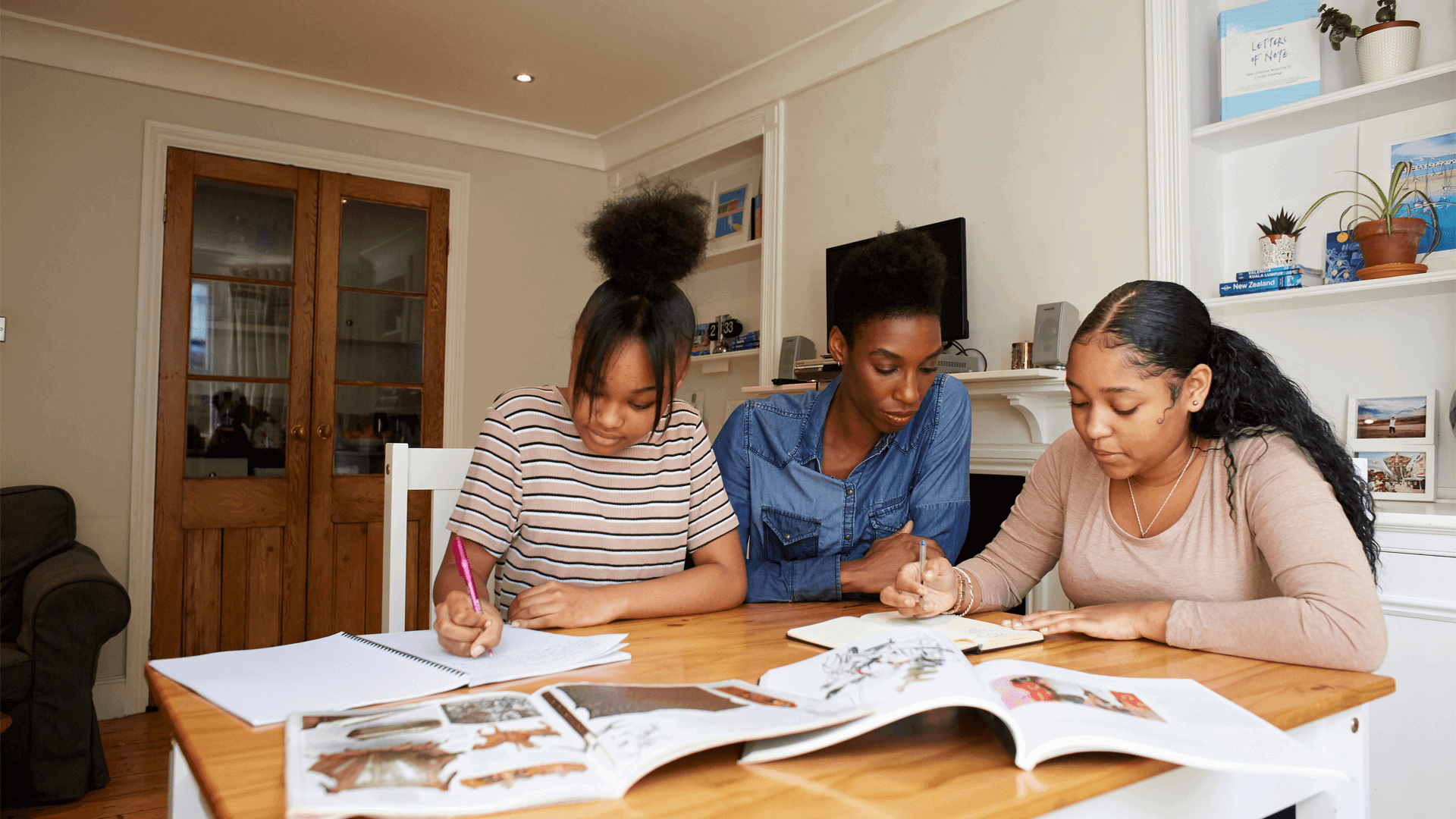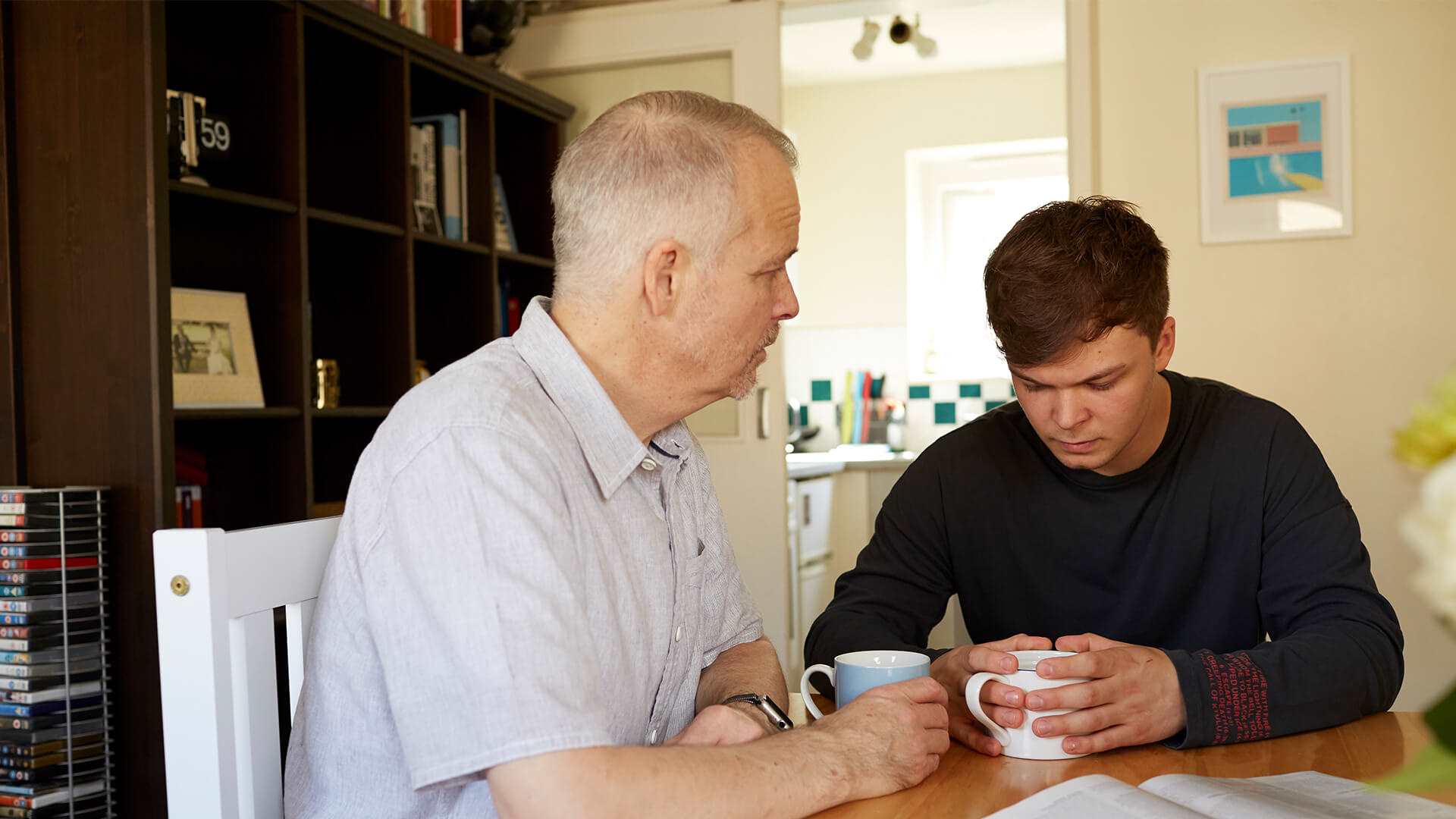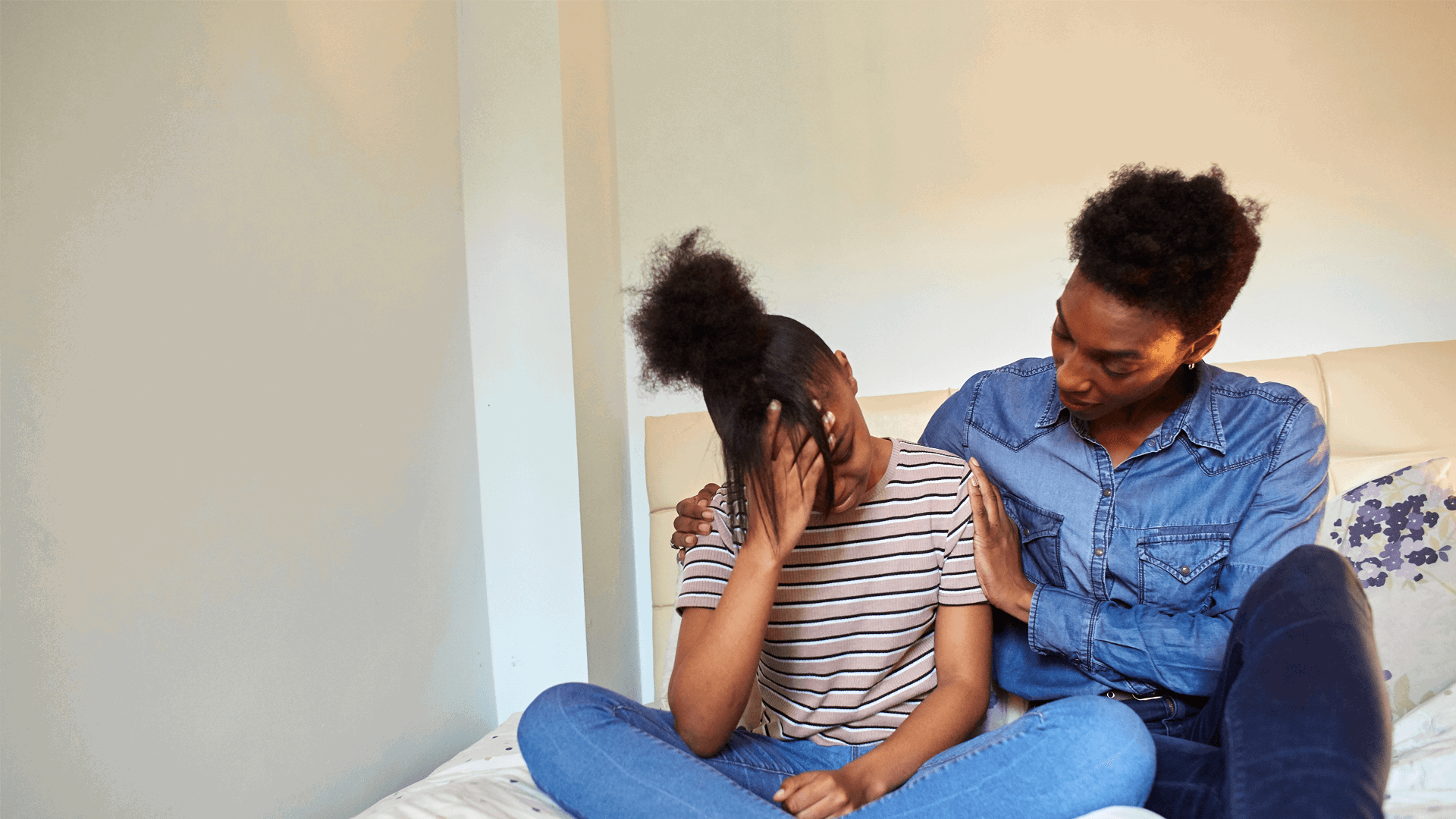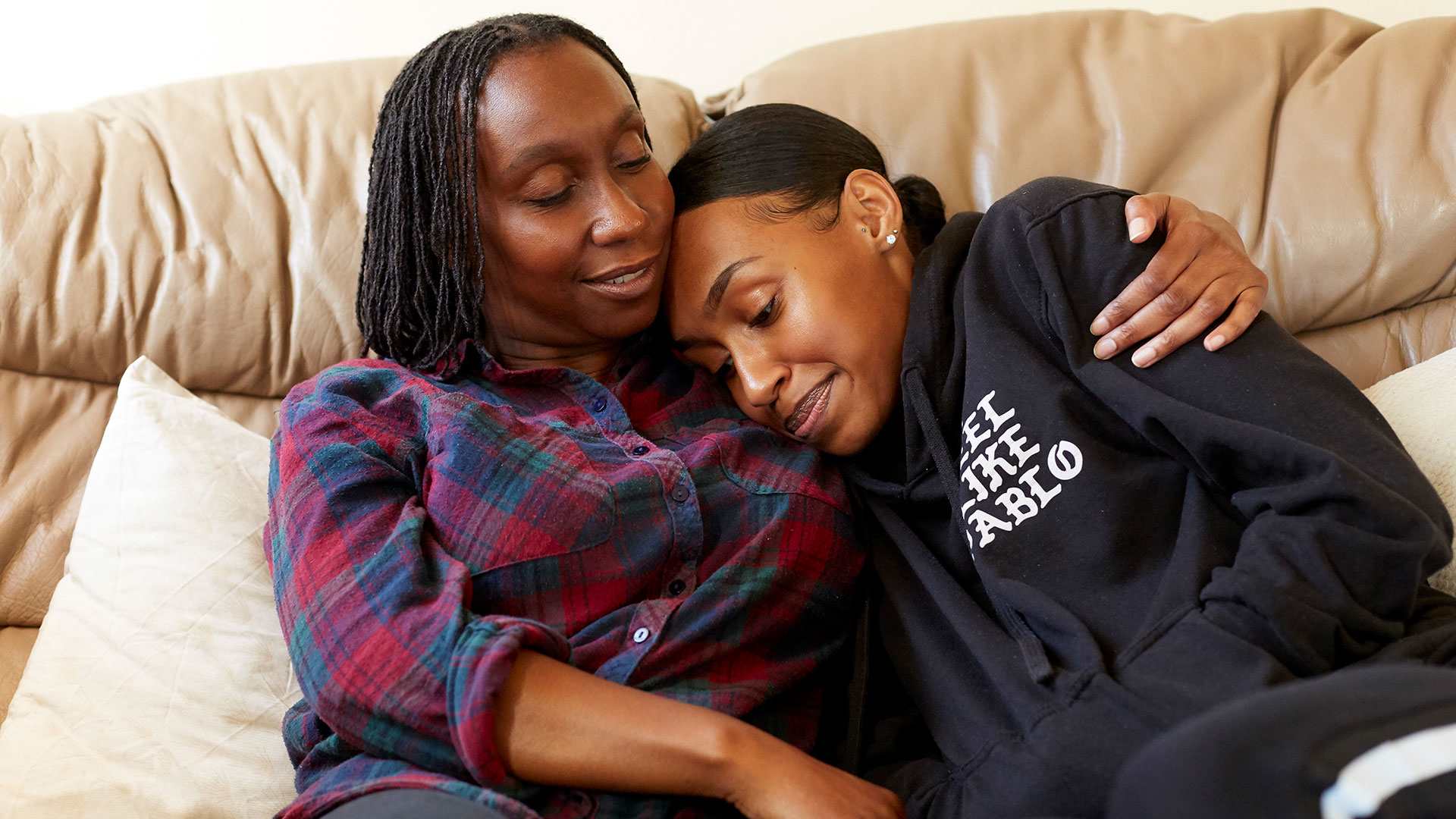
The pandemic has been incredibly stressful for parents. It's normal and entirely understandable if you're feeling exhausted, overwhelmed, frustrated or worried right now.
You might be finding it harder than ever at the moment to know how to best look after your child’s mental health and wellbeing, as well as your own.
If you’re struggling, you are not alone. We have advice and tips that can really help.
Be kind to yourself. Keep reminding yourself that you are doing your best, even if you wish you might have handled something differently that day.
How can I support my child as restrictions ease?
- Talk with them about what’s going on, keeping communication as open as you can. Let them know that it’s okay to feel however they feel – whether that’s scared, worried, angry, excited or something else. You can find our tips on starting a conversation and checking in with your child here.
- Let them know that it’s okay to move at their own pace and to only do what they feel comfortable with. As national restrictions ease, everyone will need different amounts of time to adjust and figure out what works for them. Reassure your child that they don’t need to do things the same way as other people, or compare themselves to others.
- If your child is feeling worried or anxious about the situation, they might like to make a worry box or self-soothe box to help them feel calmer. You can also have a look at all our information, advice and tips for supporting your child with anxiety here.
- Encourage your child to do the things that help them when they’re finding things difficult. This will be different for everyone – it could include things like doing exercise or going for a walk, watching a favourite film, reading a favourite book, cooking or baking, talking to friends, or drawing or writing.
- Spend time doing a positive activity together. This can help them to feel calmer by giving them a short break from everything that’s going on. It’s also a great way of providing a space for them to talk through their concerns, without having a ‘big chat’. You can have a look at our activity ideas for younger children and teenagers to help you get started.
- Keep as many regular routines going as possible to help your child feel safe and secure. This can include things like having regular times for going to bed, waking up, eating meals and doing hobbies.
My child needs to access mental health services during the pandemic
- Your child can still access emotional support from helplines, textlines and online chat services any time they need to. Childline, Samaritans and the YoungMinds Textline all provide 24/7 support. The Mix is also providing online, phone and counselling support as normal. You can find other organisations offering support for young people around specific mental health issues such as anxiety, depression, self-harm and eating problems in our Parents A-Z Guide.
- If you are worried about your child’s mental health and need professional support, contact your GP. This is still the right thing to do, and it’s important that you know that you will not be wasting anyone’s time. You may still be offered a face-to-face appointment, or they may ask you to speak to them via phone or video call. To book an appointment without going into the surgery, you can contact them by phone, use their online contact service if they have one, or visit the surgery’s website to find out the best way to get in touch.
- If your child is already being treated by Child and Adolescent Mental Health Services (CAMHS) or another mental health service, many are offering telephone or online support in place of meeting face-to-face or in groups. You can still get in touch with the service and/or your child’s key workers by phone to discuss anything you need to, including how the pandemic might be affecting their treatment.
- If your child is already seeing a therapist or counsellor, or needs emotional support and would benefit from starting therapy or counselling while the pandemic is happening, it may be possible to arrange online or phone sessions in place of face-to-face. You can ask the counsellor or therapist about this over the phone.
You can find out more about speaking to GPs, finding a counsellor or therapist, accessing CAMHS, getting help from your child’s school and finding local services on our guide to getting help.
Let them know that it’s okay to move at their own pace and to only do what they feel comfortable with.

If your child is struggling
If your child is struggling with low mood, anger, anxiety about school or a specific mental health condition, you can find more information and advice in our Parents A-Z Guide.
If you have a teenager, they may find it helpful to look at other young people's tips and experiences around looking after their mental health during the pandemic.
If you are worried about your child’s mental health and need professional support, contact your GP. This is still the right thing to do, and it’s important that you know that you will not be wasting anyone’s time.
If your child needs urgent care

If your child experiences a mental health crisis and they need urgent care, you can seek professional support in the following ways:
- If you are worried that your child is at immediate risk of harm or cannot keep themselves safe, or they have already been injured, call 999 or take them to A&E.
- If the situation is not life threatening, and a health professional has already given you a crisis number to call in this situation, call this number.
- Or, if your child is already under the care of CAMHS or another mental health team and they have a crisis plan that states who to contact when they need urgent care, follow this plan.
- You can also call your local NHS mental health helpline or 111 for urgent advice.
If you need more advice around accessing mental health services during the pandemic, you can contact our Parents Helpline to speak to one of our advisors.
My child is struggling at university
Knowing that your child is far away from you during the pandemic can feel worrying.
If child is having a hard time or struggling to cope, have a look at other parents’ ideas for ways you can support them.
If you or your child need more help, Student Minds provides mental health support and tips to students, as well as information about accessing university and other mental health support services.
It is natural to worry about them, but try to support them and help them see that they can take on this new task.
My child has lost a loved one during the pandemic

Losing someone or something we love is extremely difficult and painful. Grieving in the middle of a pandemic may feel particularly hard for your child and your family. On top of normal feelings of grief and loss, your child – as well as you and the rest of your family – may not have been able to be with your loved one in-person when they died, and this may feel difficult to accept.
Have a look at our practical tips to help you support your child and look after yourself.
I’m struggling with my child’s behaviour

It’s normal if your child’s behaviour is a bit more challenging than usual at the moment. Children and young people often express how they’re feeling through their behaviour – and many young people are feeling uncertain, anxious or frustrated right now.
Challenging behaviour can, however, be exhausting for you as a parent, and it’s important to find ways of managing it that work for you.
Have a look at our tips to help you respond to your child’s behaviour:
Challenging behaviour is exhausting and demoralising. My favourite phrase when things are tough is: this too shall pass.
I need financial support for my family
The coronavirus pandemic has made things very difficult for lots of families. If you need financial support, it is important that you reach out for help.
- If you need help getting essential items for your family, such as food and toiletries, you can find support through your local food bank. You can find food banks near you using the Trussell Trust’s directory.
- The Trussell Trust also provides a free, confidential helpline for anyone who is in financial crisis. Call 0808 208 2138 to speak to an advisor (open 9am – 5pm, Monday to Friday, England and Wales only).
- If you have lost your job as a result of the coronavirus pandemic, you may be able to access financial support. To find out how, visit the government website.
- If you are employed, but cannot work because of having less work available or because you are self-isolating or shielding, other types of financial help may also be available. You can find the government’s information about this here.
- If you are self-employed, but are getting less or no work because of the pandemic, you may be able to access a range of financial support packages. You can find out about the different options here.
- Shelter supports families who are living in poor housing conditions, at risk of becoming homeless, or homeless. You can find your nearest housing advice centre here.
- If you need urgent housing advice, you can contact their helpline by phone or webchat.
- You can also find information and advice on issues such as homelessness, evictions, benefits and council housing on their website.
How can I look after myself?

The pandemic has been incredibly challenging for parents, and it’s okay if things don’t always feel okay at the moment.
Remember that your own mental health is important too – and that this is a time to be kind to yourself. Take time when you can to check in with yourself, have a break and do the things that help you look after yourself during challenging times. These are different for everyone – it could be doing exercise, reading a book, watching a film, having a bath or speaking to friends.
Many parents who are having a hard time find it helpful to reach out to other parents so they can talk through how they have handled difficult situations and found support. You may be able to find a local parent support group using the Charlie Waller Trust directory.
If you need more help, speaking to your GP is a good place to start, and they may be able to refer you to a local support service. Sometimes it helps just having someone there who can listen to what you’re going through – and if you need someone to talk to, you can call the Samaritans anytime on 116 123.
As parents, we often (innocently and with the best of intentions) place taking care of ourselves at the bottom of the list of priorities. With our to-do lists multiplying overnight, that much-needed ‘me time’ inevitably starts to slip further down the list. But looking after our own wellbeing and self-care is so important.
Where to get help
Useful helplines and websites
-
The Mix
Offers support to anyone under 25 about anything that’s troubling them.
Email support available via their online contact form.
Free 1-2-1 webchat service available.
Free short-term counselling service available.
- Opening times:
- 3pm - 12am, seven days a week
-
Childline
If you’re under 19 you can confidentially call, chat online or email about any problem big or small.
Sign up for a free Childline locker (real name or email address not needed) to use their free 1-2-1 counsellor chat and email support service.
Can provide a BSL interpreter if you are deaf or hearing-impaired.
Hosts online message boards where you can share your experiences, have fun and get support from other young people in similar situations.
- Opening times:
- 24/7
-
Boloh
Supports Black, Asian or Minority Ethnic children (11+), young people and parents and carers who have been affected by Covid-19. You can call to talk through any worry or problem, including around issues such as bereavement, physical or mental health, financial issues or unemployment, or bullying and racism.
You can speak to someone in English, Gujarati, Urdu, Bengali, French, Spanish, Arabic, Punjabi, Mirpuri, Pothwari, Hinko, Hindi and Sundhi. Interpreters are available for other languages.
Webchat service available here during opening hours.
- Opening times:
- 10am - 8pm, Monday - Friday; 10am - 3pm on Saturdays and Sundays
-
Samaritans
Whatever you're going through, you can contact the Samaritans for support.
- Opening times:
- 24/7
-
Family Line
Provides information and support around family issues, as well as longer-term help through Befrienders and Counsellors.
- Opening times:
- 9am - 9pm, Monday - Friday
-
Gingerbread
Support for single parents in England and Wales including advice and information on child support, benefits, tax credits and your child’s contact with their other parent.
- Opening times:
- Mon 10am-6pm, Tues, Thurs & Fri 10am-4pm, Wed: 10am-1pm and 5pm-7pm
-
Anxiety UK
Provides information, support and advice for anyone struggling with anxiety.
- Opening times:
- 9.30am-5.30pm, Monday-Friday